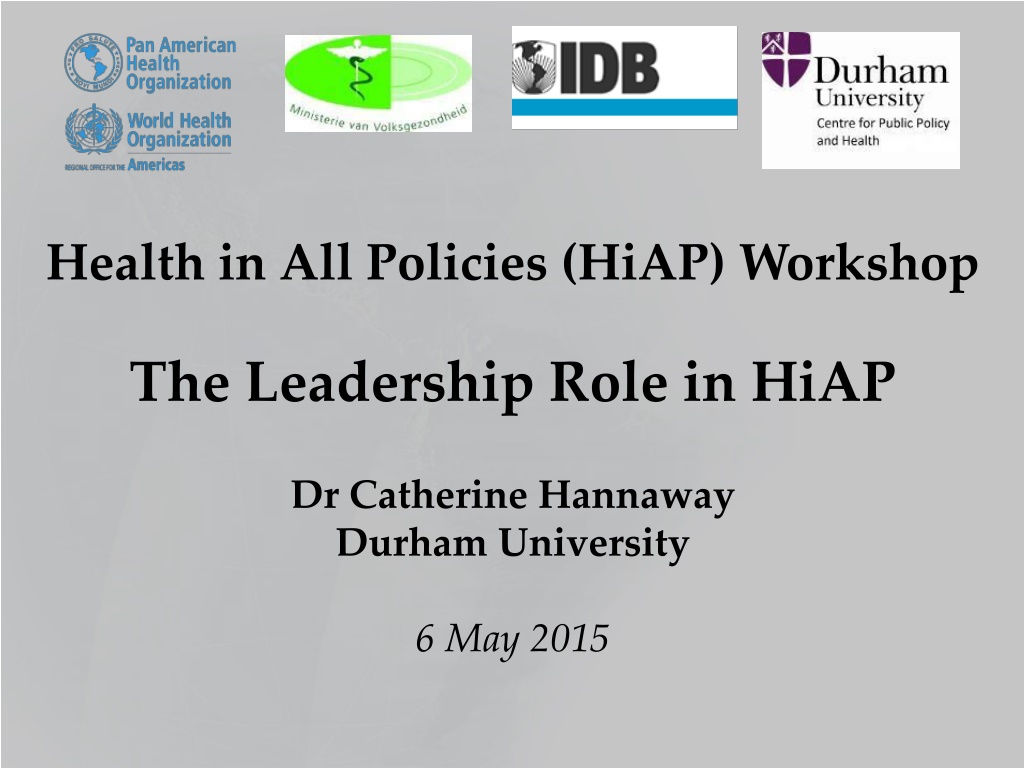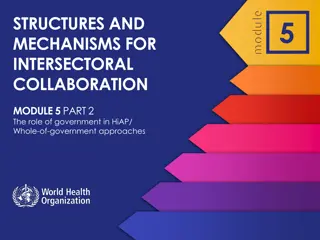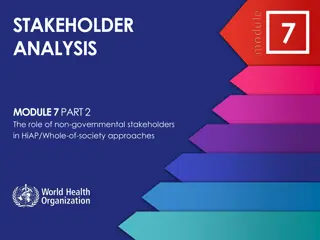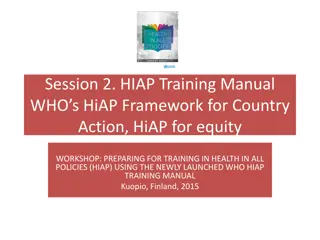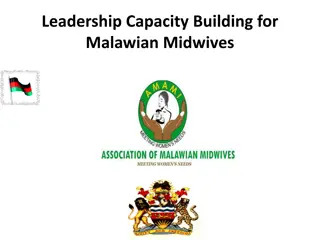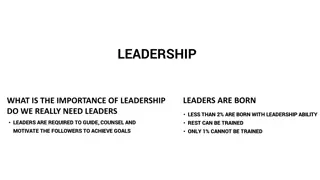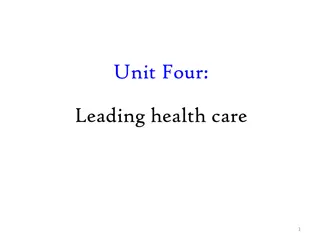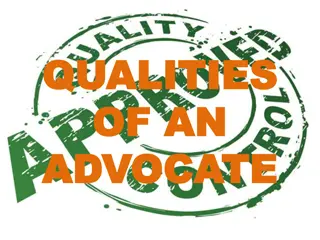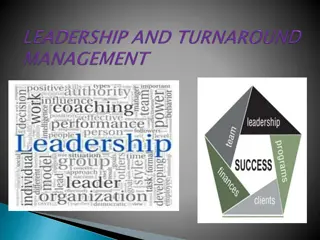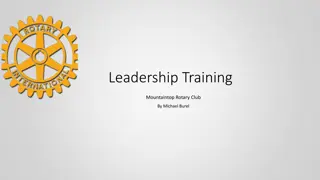Leadership Qualities for Successful HiAP Implementation
Understanding the diverse leadership roles required for Health in All Policies (HiAP) is crucial for effective implementation. This includes leadership from the health sector, other government departments, NGOs, stakeholders, and the WHO. Developing the necessary leadership qualities such as vision, collaboration, adaptability, and a focus on solutions is essential in navigating wicked problems and promoting sustainable HiAP initiatives.
Download Presentation

Please find below an Image/Link to download the presentation.
The content on the website is provided AS IS for your information and personal use only. It may not be sold, licensed, or shared on other websites without obtaining consent from the author. Download presentation by click this link. If you encounter any issues during the download, it is possible that the publisher has removed the file from their server.
E N D
Presentation Transcript
Health in All Policies (HiAP) Workshop The Leadership Role in HiAP Dr Catherine Hannaway Durham University 6 May 2015
Leadership Roles in HiAP Who needs to lead HiAP? The role of the Health Sector The leadership role of other government departments The leadership role of NGOs and other stakeholders The leadership role of the WHO. 1
Although government as a whole bears the ultimate responsibility for the health of their citizens, health ministries and authorities at all levels (national, regional and local) are key in promoting, implementing & sustaining HiAP. What kind of leadership is required by the health sector for HiAP to flourish? 2 Title of the Presentation
Typology of Problems Tame Complicated Complex (Wicked) 3
Wicked Problems: Defining Features (1) 4
Wicked Problems: Defining Features (2) Solutions may have unforeseen consequences Unstable Socially complex Solutions are better or worse, not right or wrong Context is all-important Involve changing behaviour. David Hunter, Professor of Health Policy & Management, Durham University 5
People often think of leadership in terms of personality characteristics, usually as something they call charisma. Since few people have great charisma, this leads logically to the conclusion that few people can provide leadership, which gets us into increasing trouble. Leadership is entirely different. It is associated with taking an organization into the future, and in an ever-faster-moving world, leadership is increasingly needed from more and more people, no matter where they are in a hierarchy. The notion that a few extraordinary people at the top can provide all the leadership needed today is ridiculous, and it s a recipe for failure. John P Kotter (2013) Harvard Business Review Blog 6
What are the Leadership Qualities Needed to Successfully Develop and Implement HiAP? - Leader - Leadership
The Leadership Qualities Needed to Successfully Implement HiAP Vision Strategic thinking Creativity Passion Courage Political Astuteness Understanding multiple disciplines, not just health Good Communication and listening skills Accountability Fair, Trustworthy, Open, Honest
Systems Leadership: HiAP Crossing Boundaries Old notions of leadership as dynamic, decisive, authoritarian and competitive are not well suited to the complexities of implementing HiAP Systems leadership requires a distributed approach, with well-developed skills of negotiation and consultation to enable collaborative direction-setting and decision-making with other stakeholders Good leadership is not only about the individual qualities of the leader but also about enabling the whole system to be supportive of innovation, an awareness and understanding of complexity and an appreciation of the perspectives of different stakeholders.
The Leadership Challenge for HiAP Acknowledges: Existence of wicked problems Value of a whole systems approach Political nature of complex systems. David Hunter, Professor of Health Policy & Management, Durham University
The HiAP (Complex Adaptive) Leader Manages context and relationships Understands the culture of the organisations Creates conditions that favour emergence and self-organisation Works with a notion that complex outcomes can emerge from good enough vision and minimum specifications. David Hunter, Professor of Health Policy & Management, Durham University 11
Rethinking Leadership for HiAP Collective intelligence, not individual genius From targets to a systems approach Accept the reality of wicked problems Work with uncertainty Shift from providing answers to asking the questions Acknowledge limits of the can do culture Encourage positive deviance in place of negativity. David Hunter, Professor of Health Policy & Management, Durham University
Question 1: How can leadership of HiAP have the best chance of succeeding? Question 2:
How can leadership of HiAP have the best chance of succeeding? Shared vision Realistic goals and objectives Resist over-engineering structures Invest in relationship development Ability to have honest dialogue
Why might leadership of HiAP fail? Conflict about goals and objectives Philosophical differences among partners High transaction costs building trust and consensus take time Weak accountability among partners for success or failure Pull of policy and structural silos Tribalism and territorialism the collaboration seen as detracting from mainstream initiatives Continued .
Continued. Optimum number and mix of members Importance of 'boundary spanners' Collaborative leadership style Joint ownership of decisions and collective responsibility Focus on outcomes.
Lessons from Existing Research David Hunter, Professor of Health Policy & Management, Durham University
Lessons from Existing Research Policies and procedures need to be more stream-lined, focus on outcomes not merely process and structure Those at higher strategic levels could learn from frontline practices which operate in a more organic and integrated way Partnerships in practice can be rather messy constructs Tendency to over-engineer partnerships, often to the exclusion of being clear about purpose and achievement Structures are less important than relational factors such as trust and goodwill Importance of leadership styles collaborative, integrative and adaptive. David Hunter, Professor of Health Policy & Management, Durham University
What Really Matters in HiAP Leadership? What matters is how you lead; What matters is what you say, what you do and how you behave The core idea is quite simple authentic, ethical leaders who trust one another and want to follow are servants first (Robert Greenleaf, Servant Leadership).
The Role of the Health Ministry For the health ministry to play a leading role in HiAP, it is crucial to: Promote close collaboration within the ministry Strengthen capacity to generate and use evidence on health impacts Look outward and work in partnership with other sectors and stakeholders Increase discussion of the social determinants of health and health inequity Manage and negotiate competing interests; Enforce the implementation of policies and monitor their results.
HiAP Leadership Challenges for the Health Ministry Limited political influence Constrained resources and staff turnover Working in vertical, fragmented units Difficulty gathering and disseminating evidence Politicisation of the bureaucracy, corruption and capture political commitment and discontinuity. Given the important leadership and coordination role by the health sector, any dysfunction or ineffectiveness of a health ministry can have a grave impact on a population s health. This highlights the importance of governance and politics as social determinants of health.
The Leadership Role for the WHO in HiAP Bringing health considerations into global and regional policy-making Supporting policies for global health protection and health promotion Compiling experiences of best practice as well as challenges to HiAP Providing technical assistance to countries in their efforts to apply HiAP Training health professionals and civil servants in HiAP.
Top Take-Away Messages 1. The complexity of the HiAP agenda require systems leadership approaches and networked responses at all levels to force a move beyond silo working; 2. Wicked problems require innovative, comprehensive solutions that can be modified in the light of experience and on-the-ground feedback; 3. Shared purpose matters; 4. Relationships matters allows difficult discussions to happen and builds trust; 5. Trust matters without trust, stakeholders will continue to approach things from separate organisational perspectives.
The Leadership Role in Health in All Policies (HiAP) Dr Catherine Hannaway Durham University, UK c.j.hannaway@durham.ac.uk
